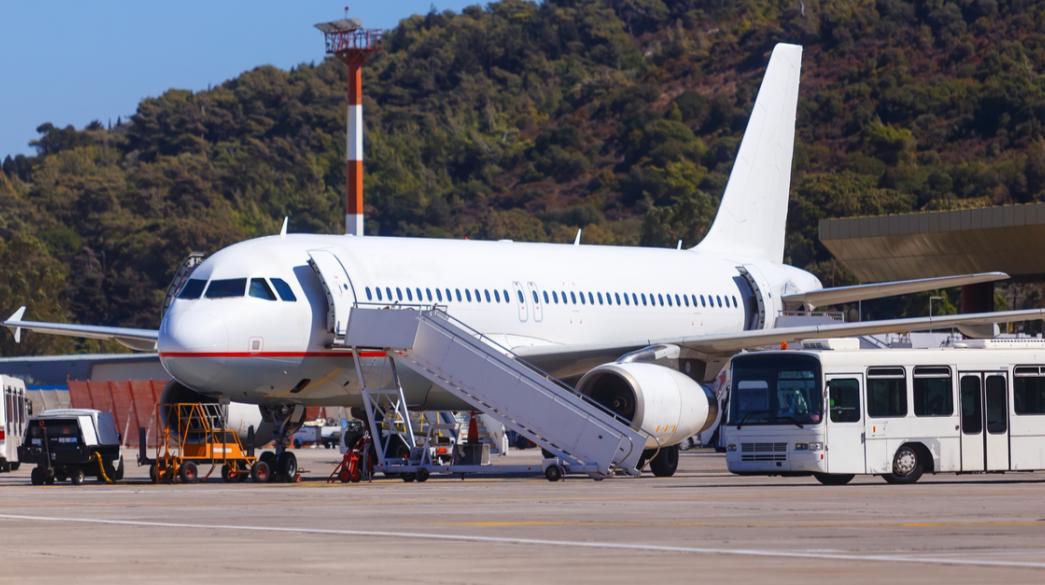All 18 regional airports in Greece are ready to reopen for international flights and tourists from abroad, having taken all necessary measures and precautions to protect the health and safety of visitors, staff and permanent residents against the novel coronavirus when flights start to arrive next Wednesday.
Deputy Civil Protection and Crisis Management Minister Nikos Hardalias on Sunday inspected the airports on the islands of Karpathos, Rhodes and Kos, continuing a round of inspections to check that all health and safety protocols are in place and up to standard ahead of reopening.
As in previous inspections on Friday and Saturday, Hardalias took part in meetings with the technical staff, local authority officials and airport managements to discuss details of the preparations and the guidelines that must be followed.
In statements on the island of Rhodes, he noted that the island was one of the main gateways for the entry of tourists and "a great wager, a big cog in our effort to restart tourism, in cooperation with the regional authority, the municipality and other agencies involved."
"We have already carried out a first inspection of the facility in terms of the spatial arrangements and on Tuesday there will be a simulation drill, which will be followed by a technical meeting that will include an Armed Forces detail and the doctors who will carry out the targeted sampling and tests, as there will be 605 tests on Rhodes each day so that we have a sufficient volume of data. I describe the testing as targeted because it will be carried out via a platform, whereby we will know at any given time for any traveller that enters the country, by filling in the mandatory document that was announced in a NOTAM on Saturday, based on which no one can enter the country without us knowing their itinerary and their route," Hardalias said.
He also emphasised that there were still difficulties to negotiate: "I think that this is a period in which we must all go the extra mile. We have passed through the first stage of difficulty but we have before us two months in which our reflexes, procedures and protocols will be tested. I think that everything will go well and it must be understood that opening up the economy, supporting tourism, is a priority but that above all else, the matter of public health is our foremost concern. On this matter there will be no shortcuts under any circumstances, no matter what the pressures. There are protocols that must be followed and, by Monday, the infrastructure for quarantines will be finalised. We are not only interested in keeping travellers safe but also the general population and the people that will receive them," Hardalias said.
As of June 27 and until August 31, based on a NOTAM issued by the Greek Civil Aviation Authority on Saturday, all passengers arriving in Greece must fill in a Passenger Locator Form (PLF) at least 48 hours before they check in for their flight, providing information that will include their departure airport, the address where they will be staying and the expected duration of their stay in Greece, among others. The information on the form is a key element of the country's planning for protection against the pandemic and preventing the spread of the virus.
Health and hygiene teams with staff from the Armed Forces will be stationed at each airport, operating under the supervision of the Deputy Ministry of Civil Defence with the assisatance of the fire brigade and Greek police, as well as the cooperation of the Hellenic National Defence General Staff, and carry out tests based on targeted sampling on passengers arriving on flights from abroad. Anyone that tests positive for the novel coronavirus will be required to stay in quarantine hotels that will operate in the capitals of all prefectures for 14 days.
The General Secretariat for Civil Protection has already issued nine self-protection guidelines against Covid-19, under the central slogan "Enjoy your stay and stay safe", with information available in English, French and German.
These include the standard advice, such as frequent use of hand sanitiser, wearing a mask, regularly and thoroughly washing hands, not touching the mouth, nose and eyes, safely disposing of used masks and gloves in closed bins, coughing into a handkerchief or elbow, keeping safe distances from others, preferring contactless transactions and avoiding lifts.
In addition, basic rules for travellers on both international and domestic flights require mandatory use of a mask for those entering the airport building, where only holders of a ticket are permitted to enter except in cases where an escort is essential, such as for children or disabled persons.
Protective barriers have been installed at all points where the public is served, while masks must be worn at all times in the airport and on flights except when they are required to be removed for security and identity checks. Changing the mask every four hours is recommended.
Staff will be equipped with PPE and a distance of 1.5 metres from others must be maintained at all times. Surfaces and equipment will be regularly disinfected while antiseptics will be available in airport waiting areas and toilets. Plastic bins used at the security checkpoints will be disinfected between each use.
Passengers are also advised to use web check-in and self-check-in, luggage tag printing, baggage drop off and e-parking where possible.
Where this can be done, passengers will walk to and from aircraft on foot.


